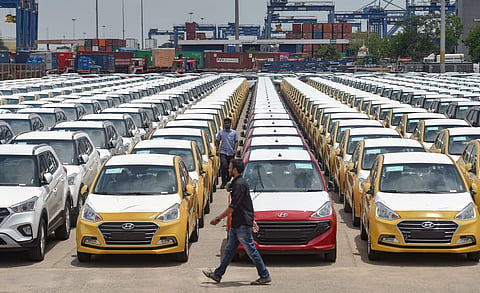

An increase in capital expenditure and infrastructure spending will not only drive economic growth but also lead to demand creation, said industrialist Venu Srinivasan, Chairman and MD of TVS Motor Company. He was speaking during the latest edition of e-expressions titled Budgeting for India’s Decade.
“We did not have much expectation from the Budget because we were coming out from a pandemic and there was also a huge fiscal deficit...
However, the Budget focused on increasing Capex and infrastructure spending, which I believe is the best thing for future because this is necessary for our economy to grow and make it more competitive,” said Srinivasan. “Look at China, the entire Chinese economy is based on excellent investment on infrastructure. I believe transparency in the Budget with increased focus on infra is the step forward,” he said.
To push growth via infrastructure creation, Finance Minister Nirmala Sitharaman had announced hiking the government’s capital expenditure for FY 2021-22 by 34.5% to Rs 5.5 lakh crore in her February 1 budget speech. The Central government’s planned capital expenditure for the current fiscal has been increased to Rs 4.39 lakh crore, as against the budgeted Rs 4.12 lakh crore.
Venu pointed out many bold steps in the Budget that will help the government meet its revenue target. “We have been slowly disinvesting and now we have moved to privatisation which is a solid thing,” he said. While the government and the industry beleives that increased infrastructure spending will combat current crisis such as high unemployment rate and slowdown in rural consumption, there is a big concern related to fund raising. To meet its expenditure target, the government will have to borrow Rs 3,500 crore per day. This may leave the future generation in debt.
Srinivasan said the answer lies in where we should invest. “This is first time when expenditure is focused on Capex. I think, if we invest in infra which has economic payback, then we will be able to recover money and reduce debt servicing. Investing in areas with no return is an issue. That’s where we are today and there is a major change in this direction,” he said.
As regards the auto sector, Venu sees a significant increase in industry Capex. “Two reasons will drive investment in the auto sector this decade. One is capacity expansion. Our exports is growing , led by Bajaj and followed by TVS. The second is shift towards Electric transportation era. All the players will have to invest heavily here,” he said.
TVS’ total exports grew by 43% registering 100,926 units in the month of January 2021 as against 70,784 units in January 2020. Two-wheeler exports registered a growth of 56% with 89,380 units in January 2021 as against 57,432 units in January 2020, despite scarcity in availability of containers. The demand in export market continues to be robust, the company had said. The company is also expanding its EV portfolio and launched iQube Electric scooter in New Delhi on Thursday.